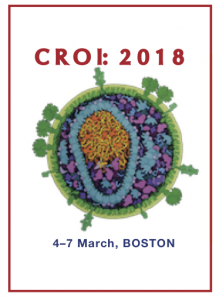Reducing risk of myocardial infarction (MI) in HIV positive people
16 April 2018. Related: Conference reports, Side effects, Weight, diabetes, metabolic complications, Coinfections and complications, CROI 25 (Retrovirus) 2018.
 Satyajit Das, HIV i-Base
Satyajit Das, HIV i-Base
Platelets, leucocytes and thrombosis
Several research groups have tried to explain the potential mechanism for the association of increased MI risk and abacavir use reported by the DAD study and others.
This year at CROI 2018 a few studies tried to explore possible mechanisms
Patrick Mallon et al, in an oral presentation and related poster, reported improved platelet activity after switching away from ABC to TAF or TVD use. [1, 2]
Glycoprotein VI (GPVI) is platelet membrane receptor that regulates platelet activation in response to collagen exposure. Activity mediated through cleavage from the platelet surface by metalloproteinase, resulting in soluble GPVI (sGPVI), which can be measured in blood. Low level of this protein can be associated with acute coronary events.
This double blind placebo controlled trial randomised 61 participants with viral suppression on abacavir/3TC to either switch to TAF/FTC or remain on ABC/3TC. All participants continued with their third drug. Platelet aggregation assay and platelet surface markers (sGP VI) were measured at week 4, and 12 by exposing the plasma sample with five different platelet agonists. Participants in the abacavir arm had lower levels of platelet aggregation and sGP VI and switching to TAF regimen improved sGPVI and reduced platelet activity to one platelet agonist at week but not to all others at follow up of 12 weeks.
An in vitro study reported similar result with abacavir use [3]. Platelets isolated from HIV negative donors were incubated with abacavir and TDF. After challenged with platelet activators like collagen or ADP, activation was more marked with abacavir. Abacavir significantly enhanced expression of platelet activation markers whereas TAF and TDF had no effect. The increased degranulation in platelets after incubation with abacavir might indicate enhanced platelet activation and potentially a pro-thrombotic impact.
Unlike earlier clinical studies, these observations were made in the absence of HIV infection, allowing assessment of direct pharmacological impacts of abacavir and TDF or TAF on platelets.
One further poster showed that an abacavir-induced pro-thrombotic effect is leucocyte mediated. [4] This was a study in mice who were pretreated with abacavir or rofecoxib (which is known to cause vascular thrombi). Abacavir induced dose-dependent vessel occlusion in non-leukopenic mice was of same magnitude as rofecoxib.
However, while the pro-thrombotic effects of rofecoxib were maintained in leukopenic mice, those of abacavir were absent. The researchers concluded that pro-thrombotic effect of abacavir in vivo depends on the presence of leukocytes, thus demonstrating a key role of these cells in the deleterious vascular effects of this drug.
Switching from abacavir to reduce CVD risk
The D:A:D study and other studies have previously shown an increased risk of myocardial infarction (MI) with abacavir use in HIV positive people who are already at high cardiovascular risk.
A poster from Priscilla Hsue and colleagues modelled the impact of interventions that address traditional risk factors on predicted MI rates, including switching from abacavir. The study used a 10-year decision tree model using evidences from published data on MI incidences after modification of potential risk factors. [5]
Assumptions about the effectiveness of interventions were based on publications from the HIV positive or general population, all adjusted for sex, age, and presence of the four risk factors (abacavir use, dyslipidaemia, hypertension and smoking).
The base case used a 50 year old HIV positive man on an abacavir-containing regimen who is also a smoker, with hypertension and hyperlipidaemia.
In this model, replacement of abacavir had the biggest impact, with a 45% reduction in the MI rate compared to those who continued abacavir.
Men who are counselled and treated for smoking cessation which resulted in an 11% MI rate reduction versus those who did not attempt smoking cessation in 10 years.
Treating hypertension and hyperlipidaemia resulted in 19% and 31% reductions in MI risk, respectively. The researcher suggested that abacavir replacement in many cases can potentially reduce the risk of MI more than modifying the traditional risk factors.
comment
There is no alternative of reducing the traditional risk factors such as smoking cessation, lowering BP and correcting dyslipidaemia. All are still essential validated health interventions. However, this decision tree model tried to show that MI risk reduction by abacavir substitution can have a significant impact.
This should not change current practice in the UK as BHIVA guidelines already recommend against using abacavir in patients who have a high risk of CVD.
This study might additionally have selection bias (not discussed in the poster). Although the papers were referenced, the method of paper selection was not discussed.
References
Unless stated otherwise, all references are to the Programme and Abstracts of the 25th Conference on Retroviruses and Opportunistic Infections (CROI 2018), 4–7 March 2018, Boston.
http://www.croiconference.org
- Mallon P et al. Platelet function upon switching to TAF vs continuing ABC: a randomized substudy. 25th CROI, 4-7 March 2018, Boston. Oral abstract 80.
www.croiconference.org/sessions/platelet-function-upon-switching-taf-vs-continuing-abc-randomized-substudy (abstract)
www.croiwebcasts.org/console/player/37179 (webcast) - Mallon P et al. Change in soluble glycoprotein VI (SGPVI) when switching from ABC/3TC to TAF/FTC. 25th CROI, 4-7 March 2018, Boston. Poster abstract 677LB
www.croiconference.org/sessions/change-soluble-glycoprotein-vi-sgpvi-when-switching-abc3tc-tafftc (abstract and poster) - Kirk A Taylor et al. Comparative impact of antiretrovirals on human platelet activation. 25th CROI, 4-7 March 2018, Boston. Poster abstract 673.
www.croiconference.org/sessions/comparative-impact-antiretrovirals-human-platelet-activation (abstract and poster) - Victor Collado-Diaz. Leukocytes are key to the pro-thrombotic effects of abacavir. 25th CROI, 4-7 March 2018, Boston. Poster abstract 674.
www.croiconference.org/sessions/leukocytes-are-key-pro-thrombotic-effects-abacavir (abstract and poster) - Hsue P et al. Comparing strategies for reducing myocardial infarction rates in HIV patients. 25th CROI, 4-7 March 2018, Boston. Poster abstract 692.
www.croiconference.org/sessions/comparing-strategies-reducing-myocardial-infarction-rates-hiv-patients (abstract and poster)

